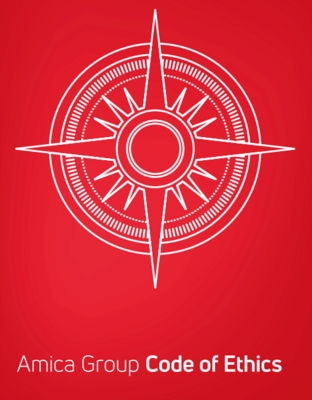In the Amica Group, top management plays a crucial role in achieving sustainable development goals.
Supervisory Board: Oversight and validation of strategic plans, including those related to sustainable development.
Management Board: Strategic management of sustainability issues.
Management Team: Ongoing management of sustainability initiatives.
Values that guide us at Amica Group:
| When and by whom? | Values that guide us |
| Business relations | A broad perspective, entrepreneurship, responsibility |
| In relation to other people | Development, cooperation, respect |
| Every employee of the Amica Group | Sincerity, openness, ambition |
In the Amica Group, we understand the principle of due diligence as an ongoing and proactive process aimed at identifying negative impacts in the areas of human rights, corruption, unfair competition, tax practices, and conflicts of interest, and making decisions within the Group that will eliminate or reduce their occurrence.
The principle of due diligence is applied in relation to six key areas of sustainability:
• Impact on human rights
• Prevention of corruption and bribery
• Combating unfair competition practices
• Tax practices
• Prevention of conflicts of interest
• Impact on the natural environment
In the Amica Group, a comprehensive Compliance System is implemented to ensure adherence to Polish and European laws, internal regulations, ethical standards, and the values of the Group.
The Compliance system of the Amica Group comprises a set of universal principles of conduct that are applicable across the entire Group and form the basis for the established Compliance Management System (CMS).
The Amica Group has a number of policies regarding to the company's operations. All policies are implemented by a resolution of the Management Board.
The Code of Ethics is a collection of the principles and values that employees, uphold and consciously nurture in our daily work and collaboration.
Principles of the Code of Ethics of the Amica Group:

Since 2019, the Group has implemented a reporting system for any irregularities, particularly in the areas of human rights, ethics, anti-corruption policy, and environmental matters (commonly known as Whistleblowing). This system enables employees and external stakeholders to report suspected, observed, or experienced violations of the Company's principles as outlined in the Business Code of Conduct, the Management Handbook, the Anti-Fraud and Irregularities Policy, and the Code of Ethics.
Every employee has the opportunity to report suspicions and/or confirm abuses anonymously or through internal communication channels.

The Group adheres to a Purchasing Policy, which is one of the key corporate documents aimed at maintaining high standards of collaboration. This policy establishes procedures and criteria regarding the quality of materials, components, and non-production goods.
Another important corporate document from the perspective of the supply chain for the Amica Group is the Business Conduct Code, along with the accompanying compliance declaration.
Additionally, the Amica Group has a supplier monitoring and evaluation system in place, which addresses issues such as the financial status of partners, environmental matters (including the possession of appropriate and up-to-date environmental certifications), as well as human rights and labor rights issues, including health and safety standards.

Amica Group is aware that risk management is the foundation of effective and sustainable operations in a dynamic business environment. Our priority is to identify, analyze and manage risks in a systematic and responsible manner, which allows us to protect our resources, support innovation and achieve strategic goals.
The risk management process is based on a defined and implemented Risk Management System (ERM), which covers all key processes and areas of activity. The implemented ERM provides the Group with increased predictability of achieving strategic goals, including stable creation of financial results and protection of the Group's current economic value (preventive function), as well as supporting decision-making processes.
The Risk Management System of the Amica Group:
• ensures comprehensive and consistent principles for identifying, assessing, planning and taking responses to risks and defines the principles of communication between process participants,
• covers all elements of the value chain,
• ensures a clear division of competences and responsibilities through specific risk ownership functions,
• is a proactive process, aimed at early identification of threats, allowing for taking preventive measures.
• is a systematic and constantly improved process. ERM is assessed annually by the Audit Committee operating at the Supervisory Board,
• co-creates the internal control system, constituting a key element of the three-line model, alongside the compliance management system,
• uses tools that allow for effective implementation of the process, i.e. risk card, risk register, risk response plan, event/incident register,
• is based on a matrix of processes and responsibilities, which enables a uniform and comprehensive approach to risk at the level of the entire Amica Group.